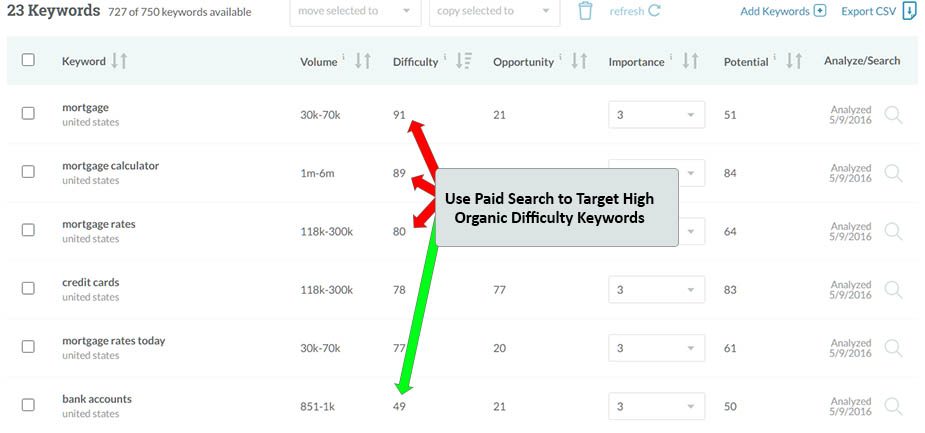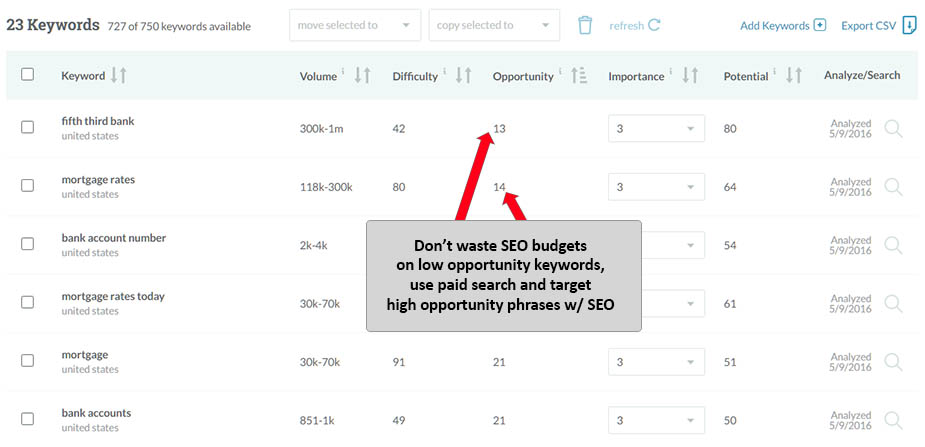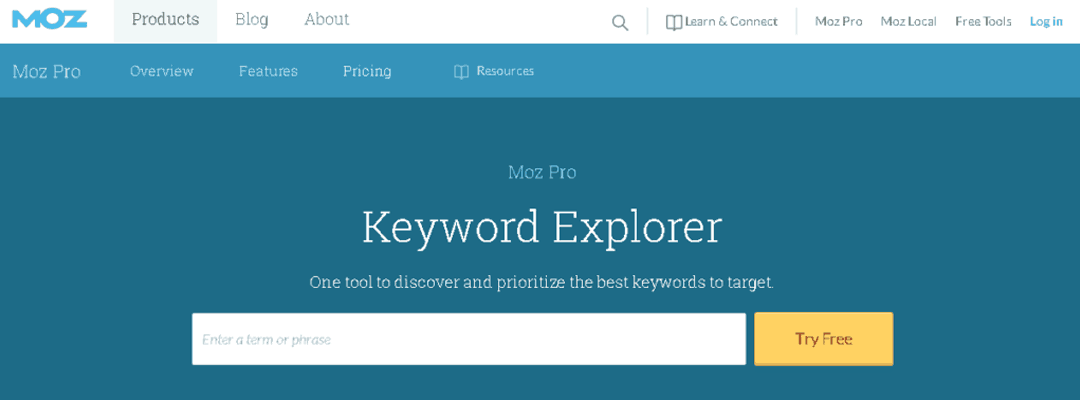
- Difficulty – a score that estimates how difficult it would be to outrank a competitor on the 1st page of the SERP.
- Opportunity – a score that estimates the relative CTR of the first 10 organic results. The more crowded the SERP is with other features (ads, knowledge panels, images, etc.) the lower this score will be.
- Potential – This metric combines keyword volume, relevance, difficulty, opportunity, and a user input called “Importance.” Each keyword in the user’s list has a dropdown list that the user can use to rank the keyword from 1 (not important) to 10 (most important). By default, each keyword is given a 3 (neutral). The highest potential keywords are those that are more relevant, have relatively higher volume, lower difficulty, higher opportunity, and are more important to the user.
Moz Keyword Explorer and Paid Search
As you can imagine, SEOs are going nuts over this tool. I thought it would be interesting to see if it could be useful for paid search advertisers, too. One way to use the Moz tool for paid search is to get more keyword ideas than Adwords Keyword Planner typically uncovers. The Keyword Planner is great at spitting out hundreds of variations of a keyword that include your base term, or a part of your base term. For example, if I give the Keyword Planner, “data center,” it will give back a long list with a lot of keywords like:- use of data center
- central data center
- data center usage
- data center design
- data center canada
- it infrastructure
- network infrastructure
- amazon web services
- virtual servers
- tier 4 colocation
Using Difficulty, Opportunity, and Potential Metrics
Although the rest of the metrics Keyword Explorer provides are meant to help marketers leverage their SEO efforts as efficiently as possible, they can be viewed as signals for paid search opportunities. For example, the terms that will consume the most time and energy before they start producing results (i.e. the most difficult keywords) could be allocated to paid search, both to get the traffic sooner and to see what the conversion rates on those keywords might be before investing too heavily in them. Keywords that have a low organic opportunity could be used as keywords in paid search. These terms are the ones for which organic search results are less dominant in the SERP, meaning the SERP is crowded with other search features. If the term you’re exploring indicates commercial intent and the SERP is filled with other features, chances are organic optimization would be a waste of your money. Use Paid Search on these terms rather than fight for just a small % of the traffic via organic. Conversely, you can also look for SERPs with 100% opportunity. While rare, they are SERPs where there are no ads at all. These might be fresh new opportunities, but be careful because there may be no ads because the term is just not commercial enough.
Keywords that have a low organic opportunity could be used as keywords in paid search. These terms are the ones for which organic search results are less dominant in the SERP, meaning the SERP is crowded with other search features. If the term you’re exploring indicates commercial intent and the SERP is filled with other features, chances are organic optimization would be a waste of your money. Use Paid Search on these terms rather than fight for just a small % of the traffic via organic. Conversely, you can also look for SERPs with 100% opportunity. While rare, they are SERPs where there are no ads at all. These might be fresh new opportunities, but be careful because there may be no ads because the term is just not commercial enough.
 Lastly, the Keyword Potential metric in Moz Keyword Explorer can be used identify opportunities in paid search. This is the metric that combines all the other metrics into a single number for each keyword. Simply sort by the terms that have the least potential organically, and pick the ones from that subset that have enough search volume. If you take this road, be sure to keep your “importance” inputs at neutral for all keywords, so that they don’t affect the metric. One unique solution is to export your keywords from Google Adwords and upload the list to Moz Keyword Explorer. This will give you the unique opportunity to compare the difficulty from Paid Search using Google’s Competition score vs the Difficulty of organic using Moz’s scores. Wherever you see disparities, there are opportunities – highly competitive paid search keywords should be targeted in organic, highly difficult organic keywords should be targeted in Paid Search.
Moz Keyword Explorer can be a powerful arrow in the quiver of any paid search advertiser. That is due to its intelligent approach to keyword discovery and its ability to show which keywords are least likely produce ROI organically in the near future.
Lastly, the Keyword Potential metric in Moz Keyword Explorer can be used identify opportunities in paid search. This is the metric that combines all the other metrics into a single number for each keyword. Simply sort by the terms that have the least potential organically, and pick the ones from that subset that have enough search volume. If you take this road, be sure to keep your “importance” inputs at neutral for all keywords, so that they don’t affect the metric. One unique solution is to export your keywords from Google Adwords and upload the list to Moz Keyword Explorer. This will give you the unique opportunity to compare the difficulty from Paid Search using Google’s Competition score vs the Difficulty of organic using Moz’s scores. Wherever you see disparities, there are opportunities – highly competitive paid search keywords should be targeted in organic, highly difficult organic keywords should be targeted in Paid Search.
Moz Keyword Explorer can be a powerful arrow in the quiver of any paid search advertiser. That is due to its intelligent approach to keyword discovery and its ability to show which keywords are least likely produce ROI organically in the near future.WEB ANALYTICS | SEARCH OPTIMIZATION | PAID ADVERTISING | COMPANY NEWS

